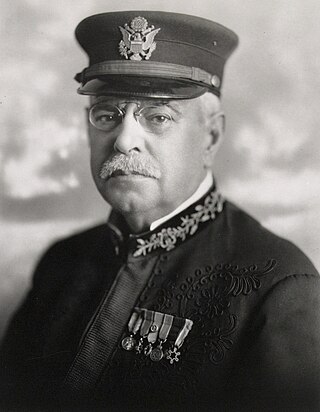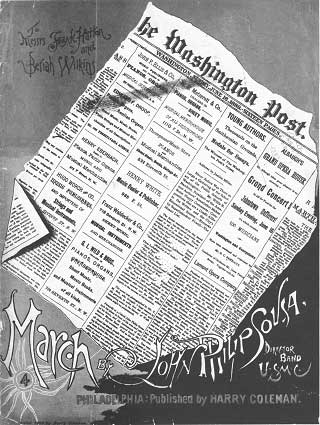
John Philip Sousa was an American composer and conductor of the late Romantic era known primarily for American military marches. He is known as "The March King" or the "American March King", to distinguish him from his British counterpart Kenneth J. Alford. Among Sousa's best-known marches are "The Stars and Stripes Forever", "Semper Fidelis", "The Liberty Bell", "The Thunderer", and "The Washington Post".

American march music is march music written and/or performed in the United States. Its origins are those of European composers borrowing from the military music of the Ottoman Empire in place there from the 16th century. The American genre developed after the British model during the colonial and Revolutionary periods, then later as military ceremonials and for civilian entertainment events.

Hans Florian Zimmer is a German film score composer and music producer. He has won two Oscars, four Grammys, and has been nominated for three Emmys and a Tony. Zimmer was also named on the list of Top 100 Living Geniuses, published by The Daily Telegraph in 2007.
"The Liberty Bell" (1893) is an American military march composed by John Philip Sousa.

"The Stars and Stripes Forever" is a patriotic American march written and composed by John Philip Sousa in 1896. By a 1987 act of the U.S. Congress, it is the official National March of the United States of America.

"The Washington Post" is a march composed by John Philip Sousa in 1889. Since then, it has remained as one of his most popular marches throughout the United States and many other countries.
A screamer is a circus march intended to stir up the audience during the show.

The United States Marine Band is the premier band of the United States Marine Corps. Established by act of Congress on July 11, 1798, it is the oldest of the United States military bands and the oldest professional musical organization in the United States. Today, the Marine Band includes the Marine Chamber Orchestra and Marine Chamber Ensembles.
The various film and theatre appearances of the Superman character have been accompanied by musical scores.

"National Emblem", also known as the National Emblem March, is a U.S. march composed in 1902 and published in 1906 by Edwin Eugene Bagley. It is a standard of the U.S. march repertoire, appearing in eleven published editions. The U.S. military uses the trio section as ceremonial music for the entry of the ceremony's official party.
The Cincinnati Pops Orchestra is a pops orchestra based in Cincinnati, Ohio, United States, founded in 1977 out of the Cincinnati Symphony Orchestra. Its members are also the members of the Cincinnati Symphony, and the Pops is managed by the same administration. Erich Kunzel, the Pops' founding conductor, continued to lead the Pops until his death in 2009.
"Manhattan Beach" is an American march by John Philip Sousa (1854–1932). It was written in 1893 to commemorate the Manhattan Beach Park resort. It follows this march style: Intro(4 bars)--[:A(16):]--[:B(16):]--Trio [:C(16):]--[:D(16):]. In part D, the tune starts quietly, grows louder and fades away. The march is notable for lacking a "stinger" or tutti chord on beat two.
"The Thunderer" is a march composed by John Philip Sousa in 1889. The origin of the name is not officially known, though it is speculated that the name is attributed to Myron M. Parker, a prominent DC politician and Freemason. It is also one of Sousa's most famous compositions.

Stars and Stripes Forever is a 1952 American Technicolor film biography of the late-19th-/early-20th-century composer and band leader John Philip Sousa. This 20th Century Fox feature was produced by Lamar Trotti, directed by Henry Koster, and stars Clifton Webb, Debra Paget, Robert Wagner, and Ruth Hussey. The film's title is taken from Sousa's "The Stars and Stripes Forever", which has become the best known of his military marches. The film was released twenty years after Sousa's death.

"The High School Cadets" is a march written in 1890 by John Philip Sousa in honor of the cadet drill team of Washington High School in the District of Columbia. It is in regimental march form (I-AA-BB-CC-DD) and is a popular selection for school concert and marching bands, as well as for professional orchestras and bands. The march has been arranged for a wide variety of instruments and ensembles, and has been frequently recorded, including at least two recorded performances by Sousa's own band. The march's final strains were featured in the 1939 film The Under-Pup.

Superman III: Original Motion Picture Soundtrack, based on the film Superman III, features contributions by Ken Thorne and various artists and was released in 1983. A CD of this album coupled with the Superman II album was released in Japan.

Heritage of the March is a series of 185 vinyl records of marches and galops released from 1973 to 1988. It remains the largest single march music record series in history, featuring close to 3,000 different marches.

"Imperial Edward" is an American military march composed in 1902 by John Philip Sousa, and dedicated to Edward VII, King of the United Kingdom. Sousa received permission to dedicate the march to Edward VII during a conversation with the royal family after his command performance concert at Sandringham on December 1, 1901. The march was premiered by Sousa's band in Montreal on May 21, 1902. Sousa would later conduct the piece for King Edward in January 1903, during a performance at Windsor Castle.

"Nobles of the Mystic Shrine" is a march composed by John Philip Sousa upon the request of his nephew, A. R. Varela. Sousa dedicated the march to the Almas Temple and the Ancient Arabic Order of the Nobles of the Mystic Shrine. It was first conducted in June 1923, with a band of around 6,200 members—the largest Sousa had ever conducted. It is one of the few Sousa marches with the first strain written in the minor mode. Contemporary versions of the march recorded by the Ottoman military band also use the Jingling Johnny in the final strain.

Boy Scouts of America is a march composed by John Philip Sousa in 1916 upon the request of Charles D. Hart. Sousa dedicated it to the Boy Scouts of America. It was premiered in October 1916 at the Metropolitan Opera House. The cover sheet features a photograph of a statuette R. Tait McKenzie's The Ideal Scout. It is considered one of the best marches Sousa ever composed, with The Reading Times writing that the march proved that the "noted composer still retains the name of 'March King'".














